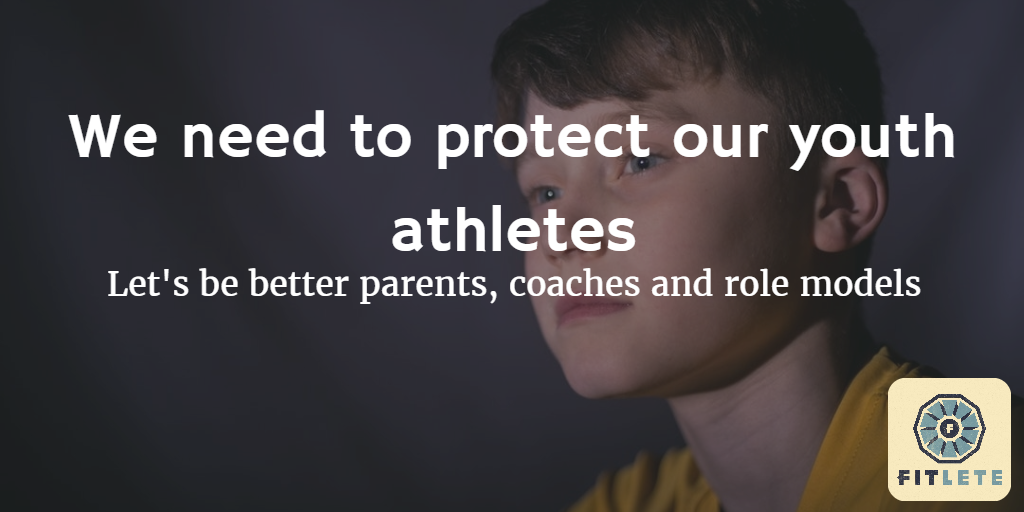Protecting The Development Of Our Youth Athletes
We admire and support the professional athletes that take the field every season but we don’t often realize that theses pros today were only a fraction of the youth programs they came from.
According to the Bureau of Labor Statistics from 2012 there are just shy of 15,000 jobs for pro athletes in the United States.
That is only a fraction of what I9 Sports claims to have in registrations for their franchise of youth sports.
It is even smaller when you look at the report that ESPN threw together in 2013 saying there are 21.5 Million kids ages 6–17 playing competitive youth sports and could even be as high as 28.5 million.
[Tweet “Protect our Youth Athletes with Better Coaches”]
We Need To Be Better Coaches
Our role as coaches should be all about the long term development of our youth athletes. I can safely say that almost 100% of the sport coaches involved in youth athletic coaching are volunteers who have had limited formal training outside of their own sports experience. It doesn’t make them bad at coaching the sport but, it can leave our youth athletes in a bit of a pickle because, as they develop from kids to young adults they can be missing some valuable components to keep them on the healthy upswing of their development.
With the threat of obesity in our youth on the rise there is another demon that is slowly showing its face; injuries. While sports may be dynamic, chaotic and full of opportunity for collision and freak accident injury they only make up a small portion of the injuries limited our youth development. There are ways to reduce injuries associated with muscular weakness that is piled up on poor mechanics like non-contact ACL tears and injuries associated with overuse like UCL (elbow) injury of a baseball player who needs Tommy John Surgery. Both of those injuries and others like them are becoming growing issues in our developing youth athletes and, at younger and younger ages every year. Injuries are hard to deal with and can ruin or stagnate the development both physically and mentally, especially if they are fighting to get back to the field of play before they are fully ready.
The Roles of Sport Coaches, Strength Coaches and the Parents
You need to be on the same page. Major injuries both physical and mental that could have been avoided are not ok or, just part of the game. If an athlete is injured they need to be informed about the process of recovery and potential limitations just as much as you do as coaches and parents. Coaches should not fight or encourage faster return to play and parents should take an active role in being their to support their athletes on and off the field. You are not expected to know everything but you should seek out answers from people who have them and, I do not mean friends and family that have their own opinions from what they read on the internet. I mean meeting with professionals that specialize in the topic you need answers in.
Rarely will all three Sport, Strength and Parent) be present in the development of our youth athletes. Community/volunteer run youth programs don’t employ coaches or Sports Medicine teams like collegiate and professional associations do. Some Families can barely afford to pay the registration fees for their kid to play forget about a a private fitness and strength coach. Hell, only some larger high schools will have Strength Coaches employed, most of the time it would be a PE teacher or the History teacher who is also an assistant coach of the team and likes exercise. These are all reasons to make sure that your kids are receiving the type of quality attention associated with being part of a youth sport. You are the physical support system, the Sports Medicine Team and the mental support of their developing character.
It is More Than just about Winning and trophies
Winning is Fun and rewarding but, unfortunately not everyone will get to experience those feelings all the time both in sports and in the real world we as adults live in everyday.
Parents: I know it’s hard to see your kids do anything else besides smile and laugh. No one wants their own kid to experience hardship or disappointment but, your kids will lose and some of them may lose really bad or more often then they win. Losing is a great learning tool and as a parent it is your responsibility to reinforce the power and benefits that losing can bring. Trust me, I get it; being a parent is easier after winning because all you have to do is say congrats and throw in a high five to fulfill your role as a parent supporting their athlete. But, to spin a loss and the initial disappointment into a positive and rewarding experience is where you will show your parenting prowess as you develop the character and work ethic of your kids.
Sport Coaches: I know you might want to win the championship you missed when you were a kid or show all your athletes what it feels like to win a championship but, the impact you can have on these kids is more than just what the scoreboard says at the end of a game. Whether you want to accept it or not, during season you are a secondary parent for every single one of your athletes. They come to you for a couple hours a day, everyday for months on end. How are you being a role model or fostering their growth outside of teaching them technical aspects of the sport they play?
Strength Coaches: The biggest win you can have is not with the sports stats your athletes have for the season but, with their ability to stay healthy and continue to develop into their athleticism. Your role is the same at the Sports coach when it comes to off the field characteristics. Instead of pushing them day in day out, given them the tools and guidance so they can eventually be the ones who push themselves.
I like to tell coaches both sports and strength that “You want to be the kind of coach that gets talked and reminisced about by their former athletes 20–30 years from when you coached them and they still address you as coach”
Those types of coaches are the ones that made an impact on the developing personal characteristics of the athletes they were in charge of.
It doesn’t matter if these little guys and gals go on to be the next Derek Jeter, Mia Hamm, Neil deGrasse Tyson or the trustworthy small business owner, local mechanic in your town. Youth athletics and competitive sports will have played a role in their development once the game clock stops ticking and the jerseys are replaced for business suits.
Originally published at fitletes.com

Thanks For taking the time out of your day to read.
If you enjoyed it then I hope you follow, It would really mean the world to me.





